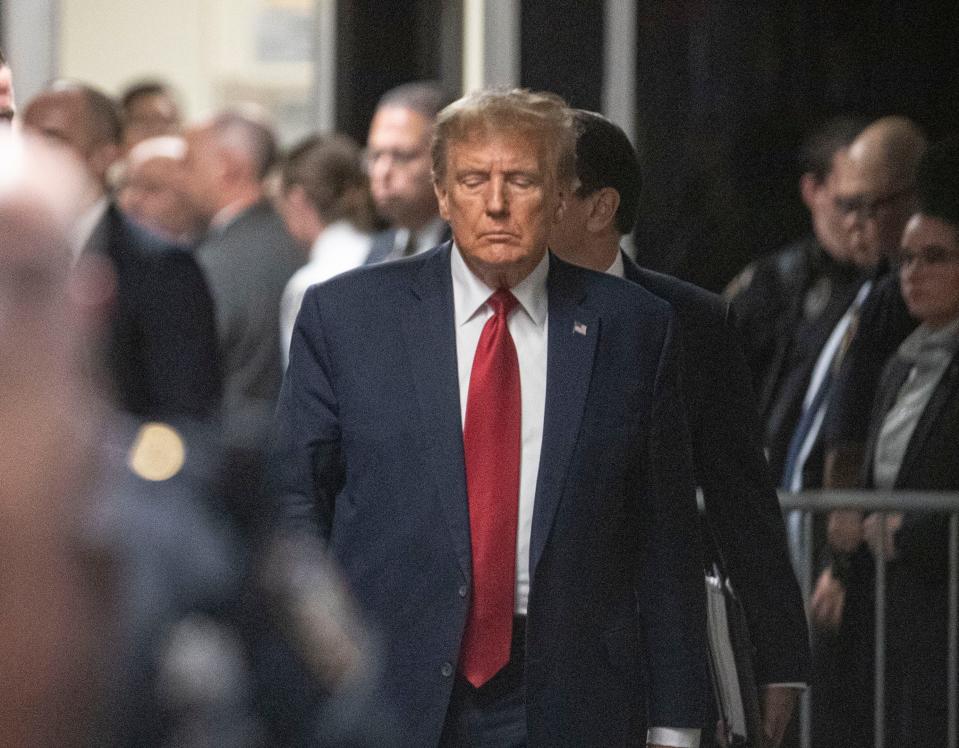Donald Trump is targeting his criminal trials from the campaign trail ahead of New York hush money case
SCHNECKSVILLE, Pa. – On a chilly and windswept weekend night in rural Pennsylvania, former President Donald Trump previewed a new and unprecedented phase of his 2024 candidacy: Campaigning while standing trial in a criminal court.
Trump's tactic of campaigning from the courthouse goes fully operational Monday, as jury selection begins for a trial on charges he tried to hide hush money payments before the 2016 election. While his court appearances and reelection campaign have already collided in civil lawsuits, Monday marks the beginning of the former president's first criminal trial.
"I'm proud to do it for you," Trump told thousands of bundled-up supporters Saturday night at fairgrounds in Schnecksville, near Allentown, Pennsylvania. "Have a good time watching."
In and around a trial that could last two months, Trump plans to use campaign rallies, news conferences and social media posts to amplify a long-standing allegation: The hush money trial – and three other criminal cases pending against him – are politically motivated attempts to destroy his campaign.
There is no evidence that federal and state officials prosecuting cases against Trump are attacking his reelection bid.
Nevertheless, Trump's supporters who braved the wind and the cold to see him at the fairground next to the Schnecksville Fire Hall said they will stick with him no matter what. Some, like Trump, did express concern that his legal troubles could kill off support from independent voters, especially if he is convicted.
"They're trying to get death by a thousand cuts," said Stayce Hawthorne, 57, a housewife and Trump supporter from Atglen, Pennsylvania.

Will Donald Trump's trial change his 2024 playbook?
Conviction or not, the hush money trial isn't likely to sway Trump's GOP base.
"They're trying to take him out," said Connie Collins, 68, a retired teacher from Coopersburg, Pennsylvania, echoing claims Trump has made since the hush money indictment was handed down over a year ago.
In the New York case, Trump is accused of falsifying business records to cover up hush money payments to multiple women. Trump's goal, prosecutors said, was to keep them quiet about their relationships with him so as not to influence voters just before the 2016 presidential election.
During the Republican primary, polls indicated that Trump's indictments may have helped the former president with more right-wing, conservative voters. But polls also showed that moderate and independent voters – the types who supported GOP challenger Nikki Haley – would not back Trump in a general election, especially if he is convicted.
GOP pollster Whit Ayres predicted that basically any verdict in the New York case will reinforce long-held perceptions about Trump. If he's convicted, the former president is expected to continue calling the case a political attack.
An acquittal or a hung jury, meanwhile, would boost Trump because "it would verify his argument" about all the cases against him.
"It's hard to imagine it would change a lot of minds," Ayres said.
Pollster Frank Luntz said Trump's voters may be immovable because "they think he's a victim; they think it's all a witch hunt, and that partisan politics are behind it."
"He's got as much of the victim vote as he is going to get," Luntz said.
Campaigning around the courthouse
During his fairground rally in eastern Pennsylvania, Trump complained that "I will be forced to sit" during what he called "a show trial."
It wasn't the first time Trump has protested his campaign and courtroom schedules. In February, after failing to get a delay in the hush money case, Trump told reporters "I'll be here during the day and campaigning during the night," and on weekends.
He added that "they want to keep me nice and busy, so I can't campaign so hard."
The former president is required to attend his criminal trial proceedings – unlike his civil lawsuits. But with the 2024 general election seven months away, Trump will be on the move on weekends and the occasional week night, holding fundraisers, meeting with advisers and staging campaign events in battleground states like Pennsylvania and Michigan, according to Trump and his aides.
Also: The hush money trial is scheduled to be in recess on Wednesdays, giving the court a chance to deal with other matters and Trump a chance to campaign.
As he did during his civil trials and pre-trial hearings, Trump is also expected to speak to the media while heading into and out of the courtroom, sometimes both.
After a March 25 hearing in the hush money case, Trump held a brief news conference at his nearby office building on Wall Street – a probable model for some upcoming trial days.
Trump's other criminal cases
Trump isn't only facing the hush money case in 2024. He is also charged with trying to steal the 2020 election from President Joe Biden in a federal case and a state case in Georgia. He is additionally accused of mishandling classified documents in a federal case that saw his Mar-a-Lago home raided.
But one wildcard that could upset the cases is an upcoming Supreme Court hearing on Trump's longshot claim that he is immune from prosecution. That argument centers around the federal indictment focused on the 2020 race for the White House.
Special counsel Jack Smith had planned to start that case in early March, but the high court's decision to hear the pre-trial immunity pushed back that schedule.
Now the hush money case, and Trump's campaign against it, go first. In the meantime, Trump will try and continue his effort to delay his other trials past Election Day on Nov. 5
Meanwhile, Trump is also seeking to delay his Georgia case, with pre-trial appeals revolving around complaints about Fulton County District Attorney Fani Willis.
This article originally appeared on USA TODAY: Donald Trump trial: Former president targets charges while campaigning
